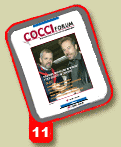
Other articles
in this issue
COCCI News
Autogenus vaccines should be backed by data; Skeletal muscle degeneration from monensin.
 Chapman: ‘You just can’t get away
from the need for data.’
|
The merits of autogenous coccidiosis
vaccines should
not supercede the need for
data demonstrating safety, efficacy
and quality, according to renowned
coccidiosis expert Dr. David H.
Chapman of the University of
Arkansas.
After he presented a paper at the
IX International Coccidiosis Conference
in Brazil, Chapman talked
with CocciForum to provide additional
insights about coccidiosis control.
On the topic of autogenous vaccines,
Chapman says, “Just because a
vaccine is derived from your own
chickens doesn’t necessarily mean
that it’s safe or effective.
“It is theoretically true that a vaccine,
unlike most drugs, may be
appropriate and effective in one place
but not another, and that local
requirements need to be considered,
which autogenous vaccines
do. However, I’m most concerned
about quality-related issues.”
There are good reasons for the
rules and procedures required to
make licensed commercial vaccines,
and you can’t “jump the gun,” he
says.
“If autogenous vaccines have gone
through the same rigorous critique
that is applied to licensed commercial
vaccines, then I have no problem
with them. My concern is that autogenous
products usually are not subjected
to the same standards, and you
just can’t get away from the need for
data.”
The poultry industry, he says, has
a right to know that what they’re buying
is safe and, of course, effective.
“And if the data isn’t there, they have
no way to know. That does the poultry
industry a disservice,” he adds.
AAP Report links Myopathy to Monensin fed at recommended levels
Skeletal muscle degeneration
from monensin, an ionophore
antibiotic used to treat coccidiosis
in chickens, can occur even when
the drug is used at recommended levels,
Dr. Scott D. Fitzgerald said in a
presentation at the 2005 annual meeting
of the American Association of
Avian Pathologists.
A number of conditions in chickens
have been associated with skeletal
muscle degeneration, also known
as myopathy. These include vitamin E
or selenium deficiency, exertional
stress and ionophore antibiotic toxicity,
said Fitzgerald, a veterinary
pathologist with the Diagnostic
Center for Population and Animal
Health, Michigan State University.
“We report several cases of
ionophore myopathy in chickens
associated with the feeding of recommended
levels of monensin,” he said.
Histologic findings were most prominent
in the thigh and leg muscles.
The development of myopathy
even when monensin was fed at the
recommended level was probably
due to improper mixing of the feed,
interaction with other antibiotics or
insufficient antioxidants within the
feed, Fitzgerald said.
Lights,
camera,
chicken!
Coccidiosis specialist Dr.
Steve Fitz-Coy (left) leads
a mesmerizing wet lab
held in conjunction with
the IX International
Coccidiosis Conference
in Brazil last September.
With a camera man
standing over his shoulder,
Fitz-Coy necropsied
chickens challenged with
various coccidial organisms
while his captivated
audience watched on a
large screen. For a free
DVD of the wet lab,
complete and return
the reply card that
accompanies this issue
of CocciForum. Offer
limited while supplies
last.
Source: CocciForum Issue No.11, Schering-Plough Animal Health.






 © 2000 - 2021. Global Ag MediaNinguna parte de este sitio puede ser reproducida sin previa autorización.
© 2000 - 2021. Global Ag MediaNinguna parte de este sitio puede ser reproducida sin previa autorización.